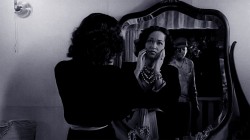Cinema | September 7th, 2016

Race relations have been hot topics in the news lately, as have problems concerning economic class, sexual abuse, drugs, and alcohol, often all interrelated. Hollywood movies tend to avoid such themes as anything other than secondary plot points in mainstream action-adventures, except for a few instances of self-consciously serious films hoping for Academy Award recognition.
This was even more true during the heyday of the classic studio system from the 1920s through the 1940s. Seventy to a hundred years ago during the height of segregation, however, there was an alternate cinema largely off the radar of typical American moviegoers, a separate industry producing and exhibiting films by and for African-Americans.
This summer Kino Video released a well-curated collection of these films to Blu-ray in an amazing and eye-opening five-disc set containing films from 1915 through 1946, with a generous selection of supplementary material.
Unexpectedly, the first three films in the set have a local connection. Three short (and quite amusing) slapstick comedies made by the Ebony Film Corporation of Chicago were produced by Marvin Pollard. According to the program notes, he often worked with his brother Fritz, who was more interested in athletics. In 1916 Fritz became the first black to play in the Rose Bowl and later went on to become the first African-American coach in the NFL. His son Fritz Pollard Jr., born about the time these films were made, was a medal-winner in the 1936 Olympics with his friend Jesse Owens, and in the late 1930s became a star athlete at the University of North Dakota.
In all the set has 16 full-length features (some of them missing footage) from 1920 through 1946, brief surviving fragments from two other features, 12 shorts from 1915 through 1940, two trailers, a 1978 archival interview with some of the stars, and a 1985 promo about the discovery of some of the films. Basic genres and subject matter cover pretty much the same things Hollywood was making: comedy, drama, romance, social status, mystery, crime, revenge, westerns, musicals, uplifting stories of faith, etc. Short films also include home movies, ethnographic documentaries, and newsreels.
Unlike Hollywood, more than a few (especially the films of the prolific Oscar Micheaux, who has eight films in the collection) deal specifically with racial prejudice, interracial relationships, and intra-racial conflict between darker and lighter-skinned blacks.
A frequent characteristic of Micheaux’s film is mixing dark-skinned actors, lighter-skinned actors (playing either blacks or whites or mixed-race people), black actors in white makeup, and white actors, as if to drive home the point that the color of people’s skin is irrelevant to their attitudes and actions. He also tends to punctuate dramatic sequences with music numbers, usually in jazz clubs. Among the major Micheaux films in the set are “Within Our Gates” (1920), “Body and Soul” (1925), “The Exile” (1931), “Veiled Aristocrats” (1932), and “Birthright” (1938). Frank Perugini’s “The Scar of Shame” (1929) is another thought-provoking look at class, domestic violence, and mixed-race issues.
Other “race films” tended to ignore the color line issue as an explicit theme, and instead strive to be typical genre movies but using all-black casts (though sometimes mixed-race production crews) set in an all-black environment. These are parallels to films made for mainstream white audiences in all-white environments. Good examples in the set include “The Flying Ace” (1926), a railroad mystery aviation romance directed by Richard E. Norman, who had a studio in Florida to make movies with black casts, and “The Bronze Buckaroo” (1939) starring Herb Jeffries, a standard California-shot B-western almost identical to the typical Hollywood product with its heroes, villains, action, comedy relief, and singing interludes, except for having an all-black cast.
Then there are all-black versions of classic stage plays, such as “Ten Nights in a Bar Room” (1926), which is actually far superior and more moving than the 1930 Hollywood film of the play, and “Dirty Gertie from Harlem, U.S.A.” (1946), an entertaining postwar cross between Somerset Maugham’s “Rain” and Prosper Merimee’s “Carmen.”
Produced independently at small studios in New Jersey, Philadelphia, Chicago, and Florida, among other locations, these films were all made on shoestring budgets. The often-amateurish performances (especially in the sound films) and budget-related continuity flaws tend to reduce their dramatic impact, yet these very limitations convey a sincerity and determination that makes their messages all the more powerful compared with slickly polished mainstream studio movies.
Picture quality of the movies varies drastically, depending on the condition of surviving film material, but all films have received new HD scans that are sharper and/or more complete than those titles that have been previously available on video. Many of the films have never before been available outside of the archives that have preserved them. Sound quality is excellent on the newly-recorded music scores for the silent films, though the scores themselves are a mixed bag of adequate to very good. Audio on the sound films is often problematic, so optional subtitles have been provided.
Approximately an hour’s worth of interesting interviews with historians and preservationists, spread over eleven separate segments on the five discs, sets the films in a social context, and discusses some of the filmmakers, individual movies, and restoration work. There’s also an archival video interview with three sisters recalling their careers on stage and screen during the 1920s and 30s. An accompanying 76-page illustrated paperbound book has five insightful essays on black filmmaking for black audiences from the 1910s through the 1940s, as well as cast, credits, and notes on each of the films included in the set.
PIONEERS OF AFRICAN AMERICAN CINEMA box set
The Collection of Movies as a group: A+ / Individual Movies: A- to C / Video: A to C+ / Audio: A to C- / Music Scores: A to C / Extras: A-
February 16th 2026
February 16th 2026
February 9th 2026
February 4th 2026
January 26th 2026



_(1)_(1)_(1)_(1)_(1)__293px-wide.jpg)
_(1)_(1)_(1)_(1)_(1)__293px-wide.jpg)
_(1)__293px-wide.jpg)